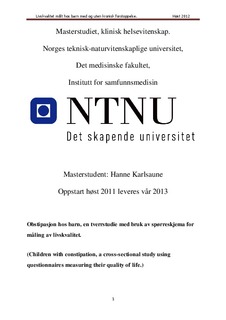Obstipasjon hos barn, en tverrstudie med bruk av spørreskjema for måling av livskvalitet
Master thesis
Permanent lenke
http://hdl.handle.net/11250/281602Utgivelsesdato
2013Metadata
Vis full innførselSamlinger
Sammendrag
Purpose: The aim of this study was to evaluate quality of life in children having Irritable
Bowel Syndrome (IBS) compared to healthy children without this illness.
Material and methods: The Pediatric quality of Life Inventory (PedsQL) was given to 50
children and their parents. 25 children with IBS were recruited at the hospital and 25 children
were randomly picked from children attending school and kinder garden in Trondheim.
Results: In the non-stratified material there was significantly worse quality of life in parentsreported children having IBS compared to children not having IBS. In the sub categories there
were significant differences in total score, physical health, functioning at school, psychosocial
health, emotional functioning, and mean score. This is described in the total score ( mean
score 91-80) 2062 – 1763 given by a T-test. In the report given by the parents of the youngest
children, there was a significant difference between the group of children suffering from IBS
and the group of healthy children, physical function. There was no significant difference
regarding quality of life in children having IBS as compared to the healthy children in the
reports given by the children themselves, both regarding the sample as a whole and between
different age groups.
This is regarding total reporting and within different group of ages. There was no significant
difference between gender or siblings in the measured quality of life. Class divided quality of
life showed no significant differences between children not having constipation and children
being ill with constipation, both in self-reports and parents-reports.
Conclusions: : In the reports from parents of children having IBS the non-stratified
material was significantly worse quality of life for children having IBS compared to children
not having IBS.
